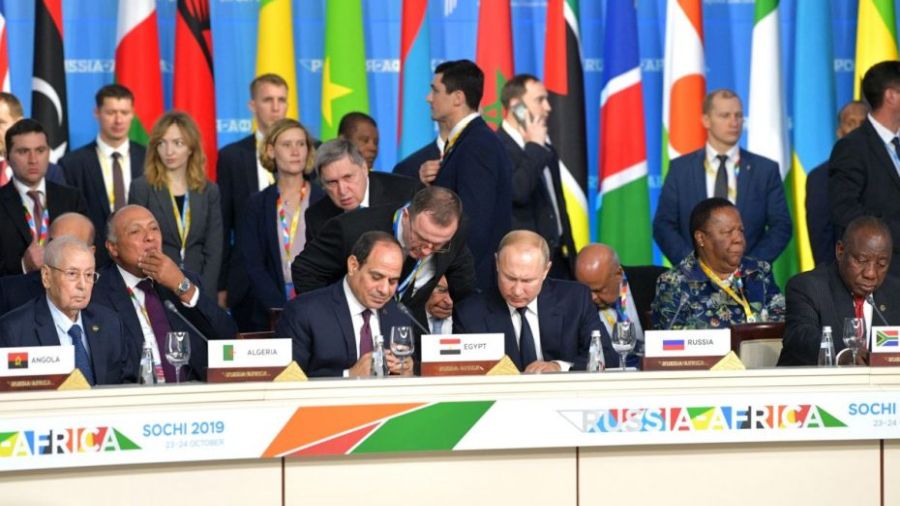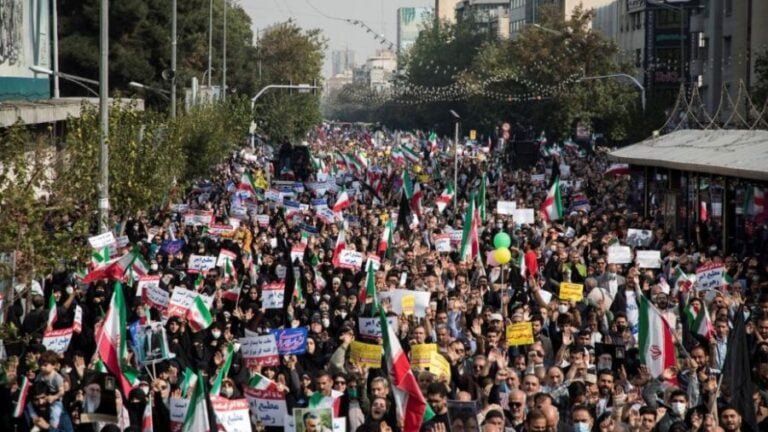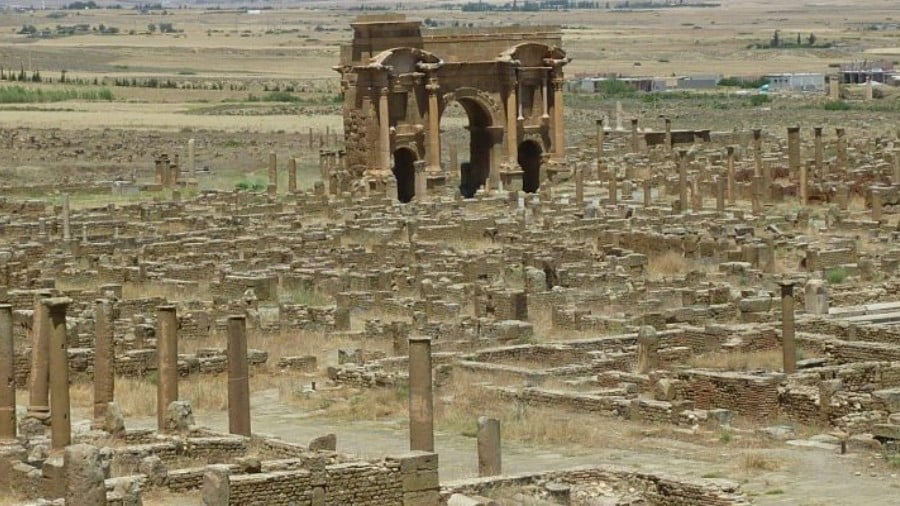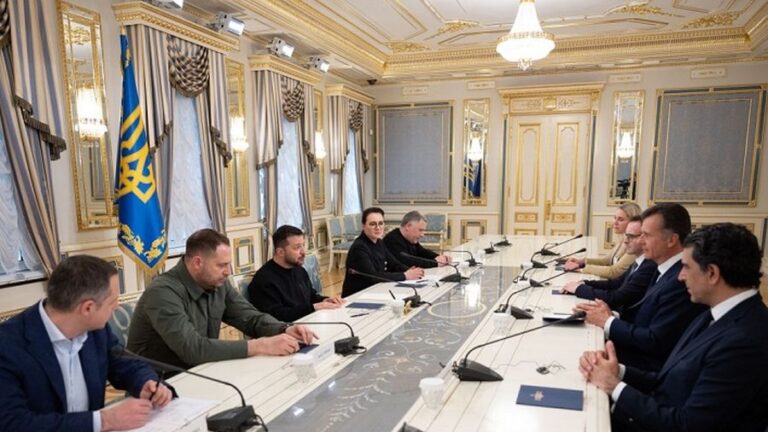Second Russia-Africa Summit Augurs Well for the Future
Is there a necessary connection between the SMO (special military operation) and food crisis in Africa?
No doubt one of the essential topics raised and to be discussed at least initially, at the Russia-Africa summit in St. Petersburg that is to take place 27-28 July 2023 is the looming food crisis.
It is enough to turn a few pages of nearly any of western newspapers and journals to learn whom they blame for such a sad state of affairs. I have just grabbed a copy of The Guardian and started turning a few pages to find a few strongly worded lines on Russia and president Putin by Samantha Power. They were as follows:
“Putin’s justification for pulling out of the agreement was full of “falsehood and lies” and the decision would have a huge impact on the least developed countries, including Bangladesh, Afghanistan, Sudan and Somalia. This is a life and death decision that Putin has made … Vladimir Putin might be willing to inflict this humanitarian pain on innocents but the U.S. is not”.
Well, where are those falsehoods and lies? There weren’t any. All was the other way around. Yet in September 2022 Chairman of the State Duma Vyacheslav Volodin was emphatic that the “grain deal” was not working as it supposed to. Poor countries in Africa received just 3% of all the shipments of wheat at the time. The rest ended up in western, supposedly affluent countries. Despite Russian utter dissatisfaction and the intervention of Turkish president Recep Erdogan and UN Secretary General Antonio Guterres, no improvements in functioning of the “grain deal” till now have taken place.
President Putin’s recent reaction amounted to withdrawing from the “grain deal” due to the EU’s reluctance to roll back sanctions on payments, shipping and insurance for Russia’s own agricultural exports. He reiterated that he would be prepared to rejoin the deal as soon as those conditions are met. Putin added: “Our country is capable of replacing Ukrainian grain on a commercial and a gratuitous basis,” stipulating that “continuing the grain deal in its current form had lost all sense”. The picture is clear. It is because of sanctions – regardless of the war – that the grain is not reaching poor nations. The unfulfilled western promises about sanctions by not being applied to grain are the western way of sabotaging the grain deal and blaming for it Russia!
Some of Russia’s African partners are affected by sanctions but are not fully aware of the background and essence of the conflict in Ukraine. For example, the Speaker of the National Assembly of the Republic of Zimbabwe Jacob Mudenda asserted that “the continent is experiencing food difficulties due to the conflict in Ukraine and the promised grain supplies do not reach Africa.” In a similar vein, the war and sanctions are interpreted by his colleagues Cyril Ramaphosa of South Africa, President Macky Sall of Senegal and President Hakainde Hichilema of Zambia who visited Kiev and St Petersburg on a peace-seeking mission on June 16-17 this year i.e. one month and ten days prior to the summit. The message as expressed by Cyril Ramaphosa neither linked sanctions to the conflict in Ukraine nor he mentioned the word “sanctions” as the source of all the troubles. The word war dominated the landscape of American justifications imposed on South African establishment. I shall quote him so there is no slightest doubt about it. On 17 June this year President Ramaphosa in St Petersburg stated:
“This war is having a negative impact on the African continent and indeed on many other countries around the world. South Africa’s neutral stance has been questioned in recent months, with the U.S. ambassador accusing Pretoria of sending armaments to Russia in a move that could endanger the country’s access to trade with the U.S. under the latter’s Africa Growth and Opportunity Act (Agoa).”
There is no doubt who is the “big brother” that applies pressure. In President’s Sall expressing dissatisfaction with the war and sanctions which appear linked even though it is not clear what causes what. On 10 July this year he told the Financial Times:
“We are facing the consequences of this war. We have big problems with our food security and agriculture. We buy fertilisers from Russia and today with the sanctions, there are difficulties paying for these goods. That is why we are talking to both sides.”
Obviously, it would be unreasonable to expect Russia’s African partners and guests to have a fairly detailed knowledge about as much as the war as about the sanctions substantially augmented towards Russia after the beginning of the SMO (Special Military Operation). As a matter of fact, it is not very surprising: after all, it would be unable to explain in greater detail conflicts for instance, in Ethiopia, Sudan or Central African Republic. So why should it expect from its African friends more than from itself? Yet, some seasoned international diplomats have a good grasp of the conflict in Ukraine. The Chairman of the Chinese Parliament, Li Zhanshu commented the conflict aptly, “There was no other way for Russia.”
Strictly speaking, one may be inclined and justifiably so, to think that sanctions would have been applied more extensively to Russia even had it not started the SMO. There are numerous western hints as well as elaborated view according to which the Russian Federation should be destroyed and divided into plenty of ethnic quasi states-fiefdoms. That’s what NATO planned after the collapse of the USSR, and one of the top U.S. ideologues, Zbigniew Brzezinski envisaged in his book The Grand Chessboard published six years after the collapse of the USSR. Whichever way you consider these aspects, it must be acknowledged that to achieve western aims in Russia, lots of sanctions had been applied against Russia prior to the SMO as well as the western-organised terrorist blowing up of the North Stream pipelines!
Russia – Africa summit: a very timely move to expand cooperation and development
The recent additional remarks by Senegalese president Macky Sall who insisted on taking up peace negotiations at the forthcoming Russia-Africa summit must be touched upon in some depth. He mentioned among other things that African Leaders “expected Russia to show a commitment to peace, including releasing prisoners of war and returning Ukrainian children taken by Russia during the conflict.”
Perhaps, that final part of his weighty remarks deserve more attention as they go beyond the usual tandem of the war and sanctions. Releasing prisoners isn’t that much controversial. Prisoners of war are frequently swapped between Ukraine and Russia and it does not seem to be a problem. However, the claim about “returning Ukrainian children taken by Russia during the conflict” may be very upsetting for the Russians and the Russian leadership, Putin inclusive. How could he say something like that? Was it the International Criminal Court (ICC) inspired? Although this court is not recognised by the Russian Federation and not part of the UN, it issued an arrest warrant for Russian President Vladimir Putin and Russian official Maria Lvova-Belova for the war crime of unlawful deportation and of unlawful transfer of (children) from occupied areas of Ukraine to the Russian Federation.
Firstly, there were a few such cases mainly due to large numbers of orphans that they were sent hurriedly to safety in Russia. Nevertheless, whenever some close relatives from the Ukrainian territory controlled by Kiev regime demanded them they were returned as soon as possible.
Secondly, I only hope that president Sall will see through as to the “return of children” by the time the summit starts. If that doesn’t happen he may be kindly explained how terribly misinformed he is.
In 2016 I ventured to Donbas to investigate personally who is shelling at whom: Donbass at Ukraine or vice versa. The rockets and projectiles were coming “over our heads” nearly every night, sometimes during the day and always from the Ukrainian side. Their target was civilian population. While staying there I bumped into dozens of people and some of them (adults and children) were those who left eastern Ukraine for Russia to save their lives. That genocide of Russians and Russian-speaking civilians has been going till now. Such supposedly respectable politicians as president Hollande and chancellor Merkel ignored it and used eight long years of the Minsk Agreements meetings not to achieve peace but to buy time to arm and train the Ukrainian military forces against Russia. This is what they admitted freely on a number of occasions without any shame. Does dishonesty in a political sense of this word equals being smart these days?
Just before the SMO at the annual Munich Security Conference German chancellor Olaf Sholtz insisted that Russian claims of a “genocide” being committed by Kiev in eastern Ukraine’s Donbass region are “ridiculous.” Denying the truth means nothing to him. Earlier some gave his personality related nicknames like “sholtzmania” and “liverwurst.” I shall give him the benefit of a doubt and I just call him “unwitting.”
I strongly believe that nowadays one has to be forceful in defending the truth. There is a great need to defend Russian president and his dignity. Keeping quiet will get us nowhere! If anything, president Putin deserves the highest possible award in the world in recognition of saving tens of thousands of human lives, children inclusive, in Ukraine. His actions made him a champion in the area of human rights and humanitarian aid. However, there is one insurmountable difficulty, difficulty with finding such an award. By what I know it doesn’t exist, for to appreciate the scale of his humanitarian input it would have to exceed the prestigious Noble Prize at least ten times!
There is no doubt that Russian politicians are very good in the business of explaining the food crisis and courteous enough. There is a need however, to turn the food crisis discussion on a new track. The summit organizers are already deeply involved in finding new routes for delivery of Russian wheat and fertilizers. Deputy Foreign Minister Sergey Vershinin assured all at a briefing last Friday that establishing new routes, is largely a logistical and technical issue and it is already being deliberated. Why then there is no officially released details? I can guess that there are two reasons. One, Russia must work them out with its African partners. Two, Russia’s western adversaries may attempt to block them.
To realize the great potential of the present summit one has to have a glimpse at the preceding one. The first Russia-Africa Summit took place on 23–24 October 2019 in Sochi in the footsteps of other “Africa +1” summits such as the Forum on China-Africa Cooperation (FOCAC), Japan’s TICAD and the U.S.-Africa Leaders Summit. As then Mr. Moussa Faki Mahamat, chair of the AU Commission highlighted the principles of the Africa-Russia strategic partnership included cooperation in agriculture, natural resource development, industry, trade, infrastructure and energy, and in the areas of military, peace and politics. At that summit it was decided to hold such events every three years.
Finally, a brief summary of its achievements. They included: 92 signed contracts and memoranda of understanding with a publicly disclosed value of $12.5bn. Within 569 meetings of the summit Economic Forum participated 6,000 of the invited people. That number included 45 heads of state, 1,100 representatives of international business, about 1,400 representatives of Russian business, over 1,900 members of official foreign delegations and over 300 Russian delegation members.
The Russian organizers of the present summit expect it to be a far more successful one. Even President Putin put his personal weight behind predictions with the forecast of signed contracts worth no less than double of what was signed for in 2019. It all sounds very realistic.
In a nutshell, what does Russia sell to and buy from Africa and what is its place in the overall structure of trade with Africa? Russia holds only 2.4% of the market share in Africa compared with 19.6% by China – the continent’s largest trade partner, 5% for the United States, France, and India. Thus, it is about time to Russia to improve its share of trade with Africa. It dominates African imports of cereals. They constitute 30% of overall African imports from the Russian Federation and wheat accounts for 95 % of the imported cereals. In addition, Africa also buys mineral fuels such as coal, oil products, and gas from Russia. These account for 18.3% of the total imports. On its part, Africa exports to Russia mainly edible fruit and vegetables, aquatic products, organic chemicals, and precious metals. In total, trade with Africa is very much in Russia’ favor.
Before I go any further, I would like to indicate that Africa is poised to shape the 21st century as the world’s fastest-growing demographic and possibly economic power. It is estimated that by 2050, Africans will make up a quarter of the global population. With its more that abundant young age labor it has a chance to become the biggest “workshop of the world.” Whether Africa succeeds depends among other factors on cooperation of such countries as Russia.
The brains behind Russia’s future trade expansion have already determined the directions of its main thrust. Russia has a lot to offer. Apart from sending more of the same, Africa needs a multifaceted advancement of Russian technologies in medicines, mining, building power projects (only half of the African population has access to electricity at present) metallurgy, shipbuilding, railways construction, variety of infrastructure, as well as space projects and food processing plants. Some projects could combine selling goods and building plants that would operate in Africa and possibly with the aim of reexporting goods or materials to Russia and other countries. Above all one can envisage a huge market for Russian high-tech goods and services with the purpose of transferring technologies. Perhaps, in line with economic and political expansion a number of Russian diplomatic staff should be increased if and when necessary? Flexibility is the name of the game.
It may be recommendable for those involved in trade with Africa – if they haven’t done so – to read Agenda 2063 that is under implementation by the African Union. The 2015 document is based in Pan-Africanism and African Renaissance. It provides a framework for addressing past injustices and the need of making the 21st Century to be the African Century.
Another consequence of the growing importance of Africa after the forthcoming summit should be possibly a discreet but thorough scrutiny of Russia’s media-wise activity. Academic research demonstrates that only 0,7% of its news is about Africa. As if it wasn’t bad enough, 75% of those news is negative.







